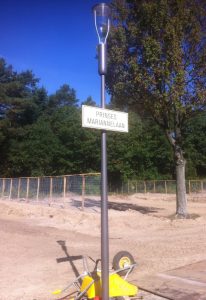
New-build plot
If you have a house built on a new building plot, in the vast majority of cases there is a purchase and building contract with the builder. You then agree that you will buy the plot and at the same time commission the builder to build a house on it. A variation on this is that you buy a plot yourself and then design and build a house on your plot with an architect and/or builder, after obtaining the necessary permissions. This is called building in private commissioning.
If the municipality allocates land for new construction in housing projects, the civil law contracts often contain strict additional conditions that the project developer and you will have to meet when building a house on the plot. These conditions are sometimes described - in visual terms - in a so-called plot passport, if some space is left for your own choices. These civil law conditions come on top of the administrative law construction and use regulations in the zoning plan, the policy on external appearance and image quality, the urban development plan and the building regulations for new construction of a residence.
If a group of private individuals is given a great deal of freedom of design and construction in a housing project to create a new residential area or building, this is referred to as collective private commissioning (CPO). Special building regulations apply and mutual cooperation agreements are made. Due to the multitude of parties and the required decision-making process in the project, there are often complex cooperative relationships and therefore risks.
Build and renovate without an environmental permit or not?
In recent years, the legislator has relaxed the regulations for building extensions and constructions in the garden. Under certain conditions, such construction and renovation projects no longer require an environmental permit, but these conditions are not always easy to apply. In many cases, therefore, building without permission is an improvement, but on the other hand, you yourself are responsible for complying with the rules for building without permission. The municipality does not assess a permit application in advance, but does check with supervisors and aerial photographs whether new buildings comply with the rules. It also happens regularly that neighbours make a report or send a formal enforcement request to the municipality.
If it turns out that the building is not exempt from planning permission after all, an environmental permit must still be applied for and the municipality will assess whether the conversion or building in the garden can be permitted.
Often, the municipality sends a preliminary warning of an order to enforce a penalty and the request to submit an application for an environmental permit. This application can then be refused by the municipality or, if it is granted, the neighbours can lodge a notice of objection and subsequently take their case to the administrative courts. If the environmental permit (eventually) does not materialise, an order for incremental penalty payments will almost always follow, with an order to demolish the building and restore it to its former state, always subject to the imposition of large fines.
See here the flyer of the government about building without permission:
Dispute with a contractor, what now?
Cooperation with a contractor requires, to a large extent, a mutual basis of trust, but the contractor is the professional party and must ensure transparent (work) agreements throughout the building process. A clear, written offer is of great importance here. A quotation which includes many set items, contains (too) many references to (unclear) additional work or omits expected extra costs, may seem the most favourable when comparing quotations. Even verbal agreements are common in practice, with negative consequences for the provability if something goes wrong.
If a problem arises in the building process, both parties will have to find a solution by mutual agreement. If this does not work well (enough), the all-important basis of trust disappears like snow in the sun and the dispute can easily escalate. We see that most problems with contractors among private clients arise from unclear agreements at the start of the work, unclear (verbal) additional work agreements before and during the work and defects that come to light upon completion and that - for whatever reason - are not repaired satisfactorily.
What does HABITAT do?
HABITAT advises on the building possibilities on a particular plot and supports you and/or your architect in contacting the authorities in order to obtain the necessary permissions, even if litigation is required. You can submit your building plan to us to assess whether it is an environmental permit-free renovation or construction in the garden. If our assessment leaves room for doubt due to the applicability of the conditions, we will contact the municipality to see how things can be resolved, if necessary and possible with an environmental permit with deviation from the applicable zoning plan.
If you receive a letter about a penalty to be imposed, we recommend that you contact us immediately. It is often possible to solve a lot of problems in good consultation with the municipality, but not responding to such letters is not an option!
Many disputes can be traced back to an unclear start. Ideally, we should be presented with a plot situation, written agreements and contracts prior to a decision to buy or award a contract to a contractor. After all, a good start is half the work, but practice usually proves otherwise.
If a dispute arises, we will look back together at the agreements made and the expectations that arose. We act primarily as a mediator, focused on restoring the basis of trust and on the proper and speedy completion of the construction process.
If a joint solution does not succeed and if the financial interest and chances of success are high enough, due to the costs involved in litigation, we will of course assist in legal proceedings to have the arbitrator or judge take a decision on the dispute and/or obtain compensation for damages. If possible, we will contact your legal expenses insurer in order to have the costs of our assistance covered (as much as possible).



